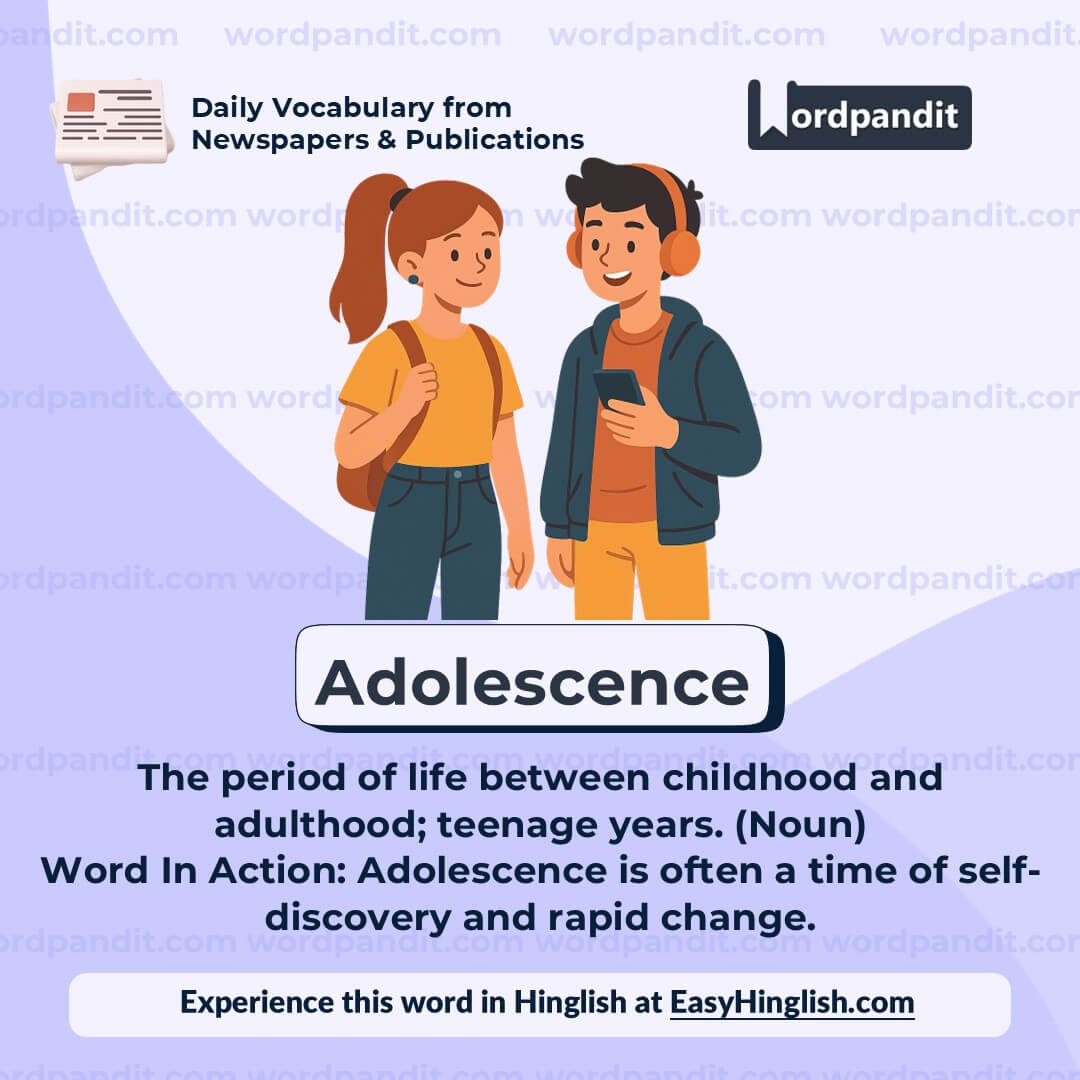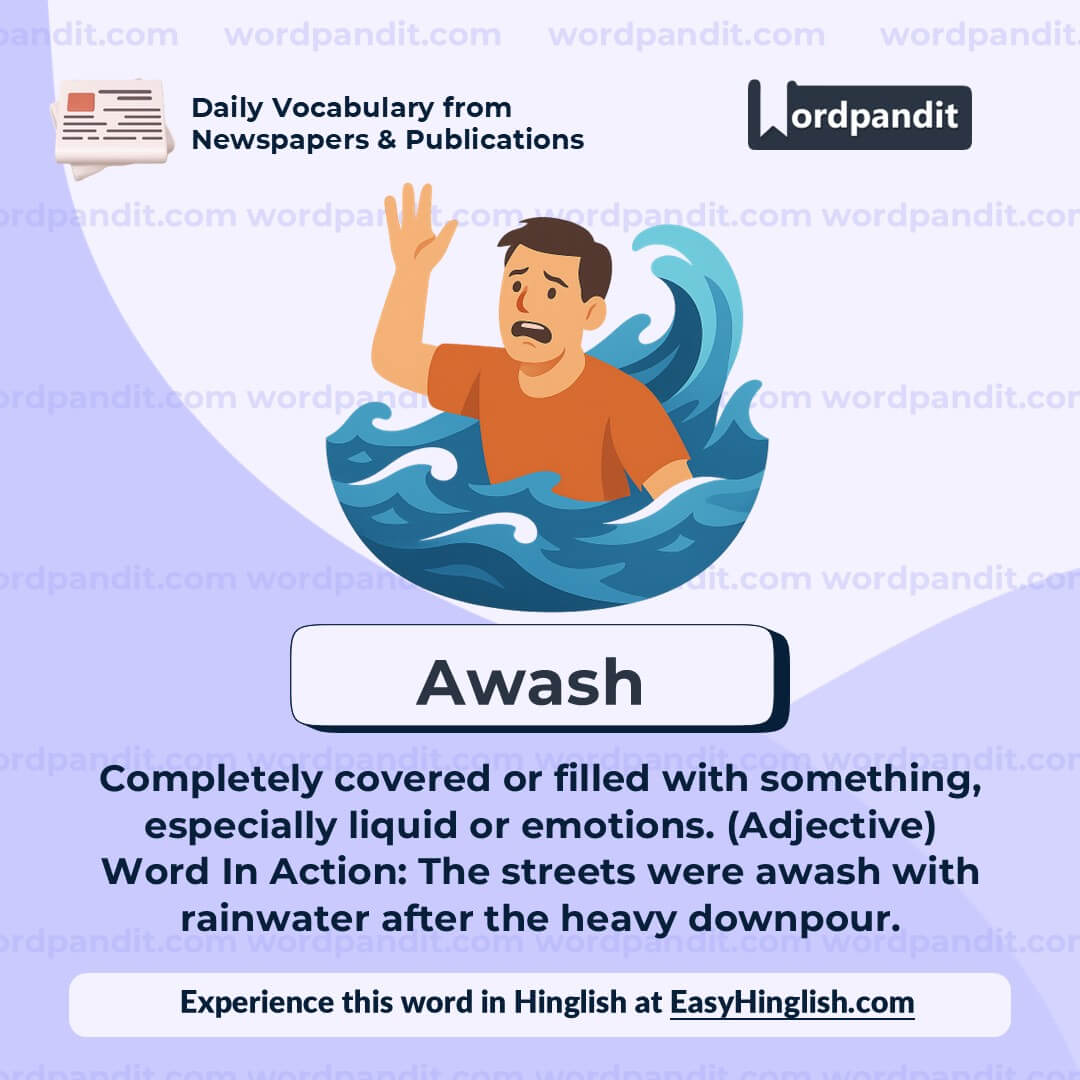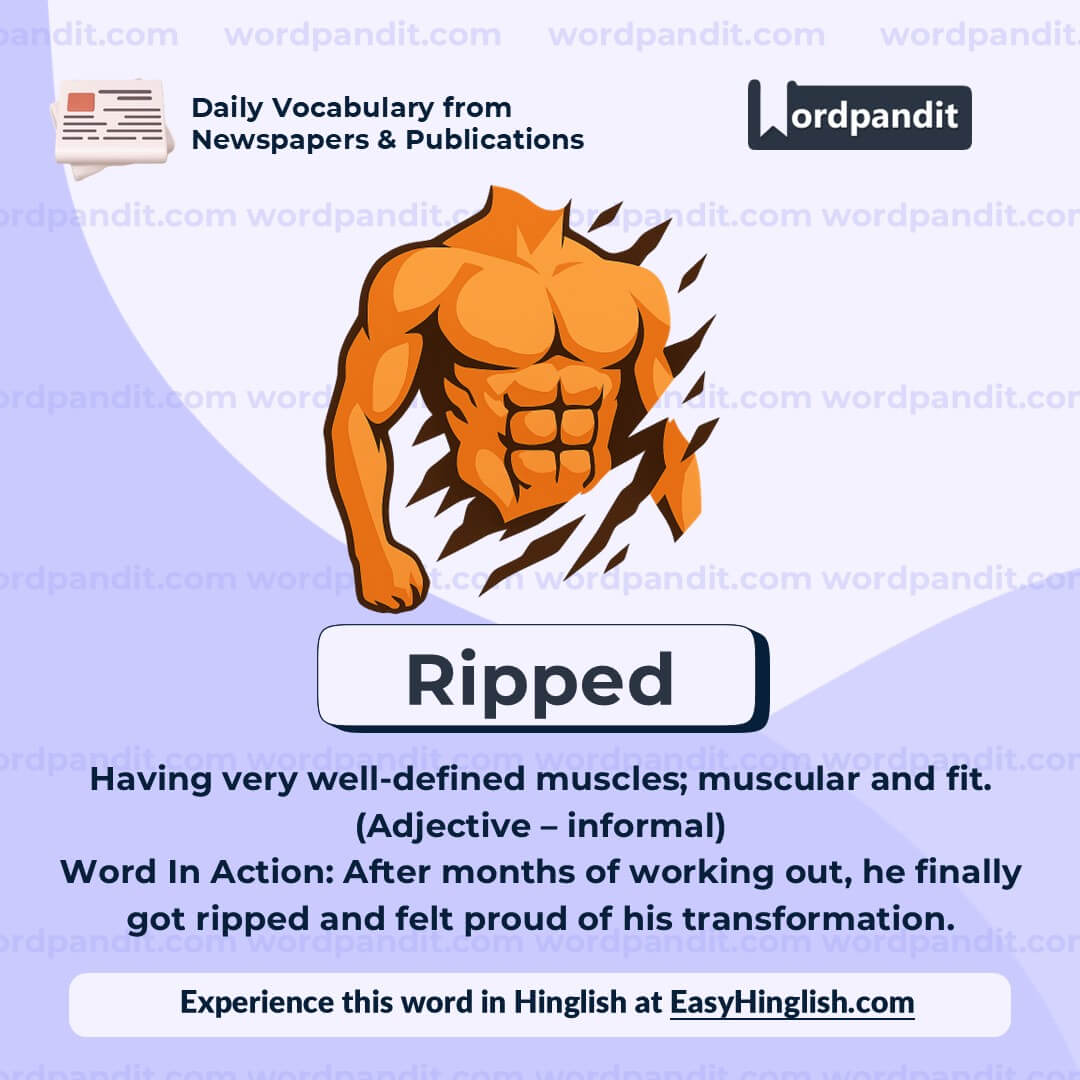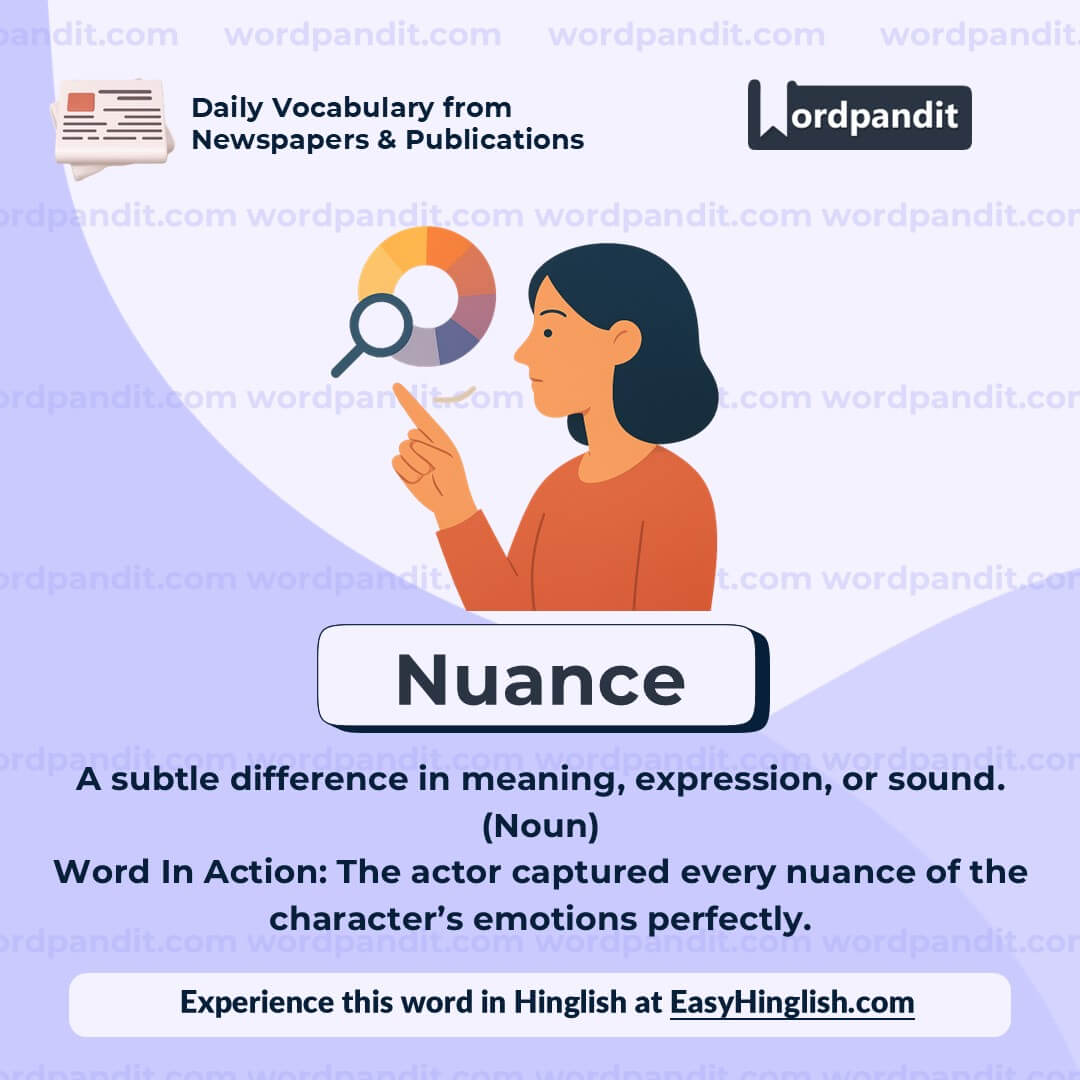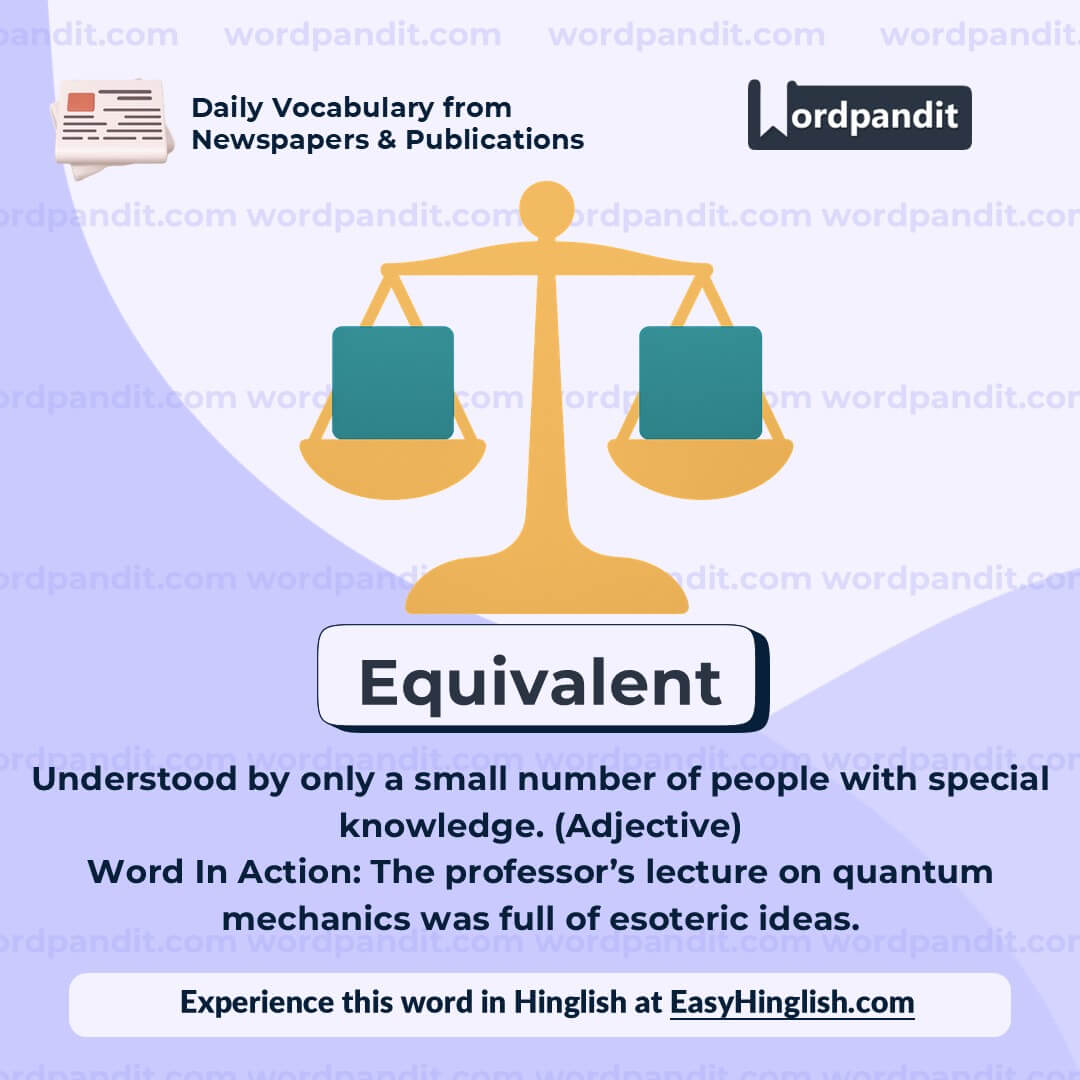Daily Vocabulary from International Newspapers and Publications
Expand Your Vocabulary with Wordpandit’s Global Vocabulary Hub
At Wordpandit, we are committed to helping you develop a truly global vocabulary by drawing from some of the most respected international publications. This section is designed to keep you ahead of the curve by introducing you to words that define global conversations and trends.
The Power of Global Sources
To help you think and communicate on a global scale, we curate vocabulary from renowned international sources, such as:
- The New York Times
- The Washington Post
- BBC
- The Guardian
- The Economist
- Scientific American
- Psychology Today
- And many more...
Stay Global, Stay Competitive
Our daily updates from international publications ensure you are consistently exposed to new words that reflect global news and developments, making sure your vocabulary is not only current but also globally relevant.
Enhance Your Global Perspective
Whether you’re preparing for international exams, aiming to excel in global business communication, or want to enhance your language skills for personal growth, Wordpandit offers the resources you need to thrive in a global context.
Effective Learning, Global Reach
Our learning methodology combines global examples, memory aids, and interactive activities, allowing you to internalize new words effectively and apply them in real-world scenarios.
Begin Your Global Vocabulary Journey Now!
Why Choose Wordpandit?
Practical Learning: Focus on words you'll actually encounter in real-world reading, enhancing your comprehension and communication skills.
Diverse Content: From current affairs to scientific breakthroughs, our varied sources expose you to vocabulary across multiple domains.
Effortless Integration: Make Wordpandit a part of your daily routine. Just a few minutes each day can significantly boost your lexicon over time.
Your Path to Vocabulary Mastery
- Visit our Daily Vocabulary section regularly
- Explore new words and their usage in context
- Practice incorporating these words into your own writing and speech
- Track your progress as your vocabulary expands
Start Your Journey Today
Embark on your vocabulary enhancement journey with Wordpandit. By consistently engaging with our daily posts, you'll build a robust vocabulary that serves you well in academic, professional, and personal contexts.
Remember, a word a day keeps linguistic limitations at bay. Make Wordpandit your daily companion in the quest for vocabulary excellence!
WORD-1: Adolescence
Context:
"Early in the first episode of the four-part Netflix series “Adolescence,” a father and son sit in a room at a police station because the son has been accused of murder." - The New York Times
Explanatory Paragraph:
Adolescence is the transitional stage of life between childhood and adulthood. It’s a period marked by physical, emotional, and psychological changes as young people begin to form their identity, gain independence, and face complex social realities. This stage often involves growth spurts, mood swings, and the development of critical thinking and personal values. The word is frequently associated with the teenage years, although its effects and transitions can extend beyond that.
Meaning: The stage of life between childhood and adulthood, typically marked by puberty and emotional development. (Noun)
Pronunciation: uh-DOH-luh-sens
Difficulty Level: ⭐⭐ Beginner to Intermediate
Etymology: From Latin "adolescentia," meaning "youth" or "growing up," derived from "adolescere" – to grow up.
Prashant Sir's Notes:
Adolescence is more than just a biological phase; it's also a cultural and psychological journey. It's a key word in psychology, education, and even literature. In essays, especially in exams, it can be tied to themes like identity, transition, rebellion, and mental health.
Synonyms & Antonyms:
Synonyms: teenage years, youth, puberty, juvenile stage
Antonyms: adulthood, infancy, maturity
Usage Examples:
- Adolescence is a critical period for brain development and emotional growth.
- Many mental health issues begin during adolescence due to hormonal and environmental changes.
- In literature, adolescence is often portrayed as a time of confusion and self-discovery.
- Parents and teachers play a vital role in guiding children through adolescence.
Cultural Reference:
"Adolescence is like having only enough light to see the step directly in front of you." - Sarah Addison Allen
Think About It:
How does the way we experience adolescence shape who we become as adults?
Quick Activity:
Write down three key events from your own adolescence that had a lasting impact on you. Then, describe how they helped shape your identity.
Memory Tip:
Think of the word “adolescent” as someone who is “adding lessons” – growing by learning through life experiences.
Real-World Application:
Understanding adolescence is essential for educators, parents, counselors, and policymakers. It helps in addressing youth issues like peer pressure, academic stress, and emotional well-being with empathy and effectiveness.
WORD-2: Awash
Context:
"The problem is that the internet is awash with half-read and mostly misunderstood philosophy. It is made up of a series of quotations — often from Nietzsche, Rumi, or Camus — ripped from a single line of a very complicated book. It’s wisdom, but out of context and stripped of nuance. The million-follower accounts on social media tear out pithy aphorisms from huge, well-argued tomes to broadcast the philosophical equivalent of “live, laugh, love.”" - Big Think
Explanatory Paragraph:
“Awash” is used to describe something that is completely filled, flooded, or overflowing — either literally (like a beach awash with waves) or metaphorically (like a website awash with misinformation). In the context above, the internet is described as being full or flooded with out-of-context philosophical content. The word often conveys the idea of being overwhelmed or saturated by something.
Meaning: Filled, flooded, or overflowing with something, often to an overwhelming degree. (Adjective)
Pronunciation: uh-WOSH
Difficulty Level: ⭐⭐ Intermediate
Etymology: Derived from Middle English "awasshen," meaning "to wash over"; influenced by the idea of something being thoroughly washed or flooded.
Prashant Sir's Notes:
This word is often used metaphorically in academic writing and journalism to describe things being saturated or overrun — “awash in data,” “awash with emotion,” “awash in money.” It adds a vivid imagery of excess or inundation. Keep this word in mind when describing overwhelming abundance or overexposure in essays.
Synonyms & Antonyms:
Synonyms: flooded, overflowing, saturated, inundated, teeming
Antonyms: dry, barren, empty, lacking
Usage Examples:
- Her inbox was awash with emails after the product launch.
- The town was awash in color during the spring flower festival.
- The news cycle is awash with political scandals these days.
- Financial markets were awash with uncertainty following the announcement.
Cultural Reference:
"The world is awash in information, yet starving for wisdom." – A paraphrase of a quote often attributed to E.O. Wilson, highlighting the modern dilemma of information overload.
Think About It:
In what areas of life today are we most “awash” in content or influence — and how does that affect clarity of thought or decision-making?
Quick Activity:
Write a sentence using “awash” to describe your school, workplace, or favorite app. Bonus: Try using it in both a literal and metaphorical sense.
Memory Tip:
Think of “awash” as “a wash” — like being completely soaked or covered in something. Whether it’s water, ideas, or information, you’re surrounded by it.
Real-World Application:
Use “awash” in writing or speech when describing oversaturation — whether it’s social media platforms awash with trends, cities awash in nightlife, or industries awash with competition. It’s vivid and impactful in opinion pieces and reports.
WORD-3: Ripped
Context:
"The problem is that the internet is awash with half-read and mostly misunderstood philosophy. It is made up of a series of quotations — often from Nietzsche, Rumi, or Camus — ripped from a single line of a very complicated book. It’s wisdom, but out of context and stripped of nuance. The million-follower accounts on social media tear out pithy aphorisms from huge, well-argued tomes to broadcast the philosophical equivalent of “live, laugh, love.”" - Big Think
Explanatory Paragraph:
“Ripped” in this context refers to something taken out forcefully or abruptly from its original place. When applied to text or quotations, it implies a lack of care or nuance — as though something meaningful has been snatched from its context, resulting in distortion or misinterpretation. The word has both physical and metaphorical uses, ranging from torn clothing to decontextualized ideas.
Meaning: Taken away or removed forcefully, often without regard to context or completeness. (Verb – past tense of “rip”; also used as an adjective)
Pronunciation: RIPT
Difficulty Level: ⭐ Beginner
Etymology: From Middle English “rippen,” of Scandinavian origin; related to Norwegian “ripa” (tear or scratch).
Prashant Sir's Notes:
“Ripped” is a strong, vivid word often used to show violence, urgency, or distortion. In academic or editorial contexts, “ripped from context” is a common critique of oversimplified or manipulated information. Watch for its metaphorical use, especially in opinion writing or critical commentary.
Synonyms & Antonyms:
Synonyms: torn, extracted, removed, yanked, pulled out
Antonyms: placed, inserted, embedded, attached
Usage Examples:
- The quote was ripped from the article without any context, changing its meaning entirely.
- He accidentally ripped his jeans while climbing over the fence.
- That scene was ripped straight from a 90s action movie — dramatic and over the top.
- Ripped from the headlines, the show explores real-life legal dramas.
Cultural Reference:
“Ripped from the headlines” is a phrase popularized by the TV series *Law & Order*, indicating that episodes are inspired by real-world events. It highlights how stories can be dramatized or altered when taken from their original sources.
Think About It:
What are the risks of using information or quotes that are ripped from their original context — especially in the age of social media?
Quick Activity:
Find a quote from a famous author or philosopher. Now, write two short versions: one ripped from context and one with full context. Compare how the meaning changes.
Memory Tip:
Think of the word “ripped” like “ripping a page” — once it’s torn from the book, it loses part of the story. That’s exactly what happens when meaning is removed from context.
Real-World Application:
Understanding how content can be “ripped” out of context is crucial in media literacy, critical thinking, and research. Whether evaluating news, memes, or quotes, always seek the full context to avoid misinterpretation.
WORD-4: Nuance
Context:
"The problem is that the internet is awash with half-read and mostly misunderstood philosophy. It is made up of a series of quotations — often from Nietzsche, Rumi, or Camus — ripped from a single line of a very complicated book. It’s wisdom, but out of context and stripped of nuance. The million-follower accounts on social media tear out pithy aphorisms from huge, well-argued tomes to broadcast the philosophical equivalent of “live, laugh, love.”" - Big Think
Explanatory Paragraph:
“Nuance” refers to the subtle distinctions, fine details, or slight variations that add depth and complexity to something — whether it's a thought, argument, color, or emotion. When something is stripped of nuance, it becomes oversimplified and loses its original richness or accuracy. Nuance is crucial in understanding sophisticated ideas, literature, or philosophical arguments, as it allows for more layered and meaningful interpretations.
Meaning: A subtle or slight difference in meaning, expression, tone, or feeling. (Noun)
Pronunciation: NOO-ahns
Difficulty Level: ⭐⭐⭐ Intermediate
Etymology: From French "nuance," meaning "shade" or "subtle difference," originally from Latin "nubes," meaning "cloud."
Prashant Sir's Notes:
Nuance is an essential word for writing essays, especially in subjects like literature, philosophy, and ethics. When analyzing texts or arguments, pointing out the “nuance” shows you’re thinking critically and appreciating complexity — a major plus in academic writing!
Synonyms & Antonyms:
Synonyms: subtlety, distinction, refinement, shade, gradation
Antonyms: bluntness, obviousness, simplicity, clarity (when used to mean lack of complexity)
Usage Examples:
- The author's argument was full of nuance, challenging readers to consider multiple perspectives.
- Great actors bring nuance to their performances, making characters feel real and relatable.
- His explanation lacked nuance and failed to capture the complexity of the issue.
- In cross-cultural communication, nuance can be the key to avoiding misunderstanding.
Cultural Reference:
In political discourse, journalist Ezra Klein frequently emphasizes the importance of nuance, arguing that today's polarized world often overlooks the gray areas in favor of extreme simplicity.
Think About It:
Why do you think nuance is often lost in social media debates or short-form content? What are the consequences?
Quick Activity:
Take a commonly debated topic (e.g., social media, AI, education) and write one nuanced sentence about it — one that acknowledges both pros and cons.
Memory Tip:
Remember: “Nuance” sounds like “new ants” — hard to see, small details crawling under the surface. That’s what nuance is — the tiny, easy-to-miss parts that matter.
Real-World Application:
In law, diplomacy, journalism, and education, recognizing and conveying nuance is critical. It allows professionals to navigate complex situations with sensitivity, avoiding oversimplification and fostering deeper understanding.
WORD-5: Equivalent
Context:
"The problem is that the internet is awash with half-read and mostly misunderstood philosophy. It is made up of a series of quotations — often from Nietzsche, Rumi, or Camus — ripped from a single line of a very complicated book. It’s wisdom, but out of context and stripped of nuance. The million-follower accounts on social media tear out pithy aphorisms from huge, well-argued tomes to broadcast the philosophical equivalent of “live, laugh, love.”" - Big Think
Explanatory Paragraph:
“Equivalent” is used to describe something that is equal in value, meaning, function, or effect to something else. It doesn’t have to be identical, but it carries the same weight, significance, or role. In the context above, the phrase “philosophical equivalent of ‘live, laugh, love’” suggests that the oversimplified quotes online reduce deep philosophy into something as shallow and cliché as the popular slogan — losing the original depth and complexity in the process.
Meaning: Something that is equal in value, function, meaning, or effect. (Noun / Adjective)
Pronunciation: ee-KWIV-uh-luhnt
Difficulty Level: ⭐⭐ Intermediate
Etymology: From Late Latin "aequivalentem," meaning "of equal worth," from "aequus" (equal) + "valere" (to be strong, to be worth).
Prashant Sir's Notes:
“Equivalent” is a very useful word in comparative writing — especially in essays that analyze themes, ideas, or statistics. Use it when drawing parallels between two things that serve similar functions or have similar impacts, even if they differ in form.
Synonyms & Antonyms:
Synonyms: equal, counterpart, match, parallel, peer
Antonyms: opposite, unequal, different, contrast
Usage Examples:
- Ten U.S. dollars is roughly equivalent to nine euros at today’s exchange rate.
- Their silence was taken as the equivalent of agreement.
- This app is the digital equivalent of carrying a full notebook.
- Wearing a fake badge is not equivalent to having actual authority.
Cultural Reference:
In mathematics and logic, “equivalent” is a precise term. For instance, in geometry, two shapes may be said to be "equivalent" if they have the same area, even if their shapes differ. This idea translates metaphorically into many areas of thought and debate.
Think About It:
Can two ideas or actions ever be truly equivalent, or is some degree of difference always present when comparing meaning and intent?
Quick Activity:
Think of two things in your daily life that serve the same purpose (e.g., tea and coffee, texting and calling). Write a sentence using “equivalent” to describe their relationship.
Memory Tip:
“Equivalent” contains “equal” — so think of it as “equally important or equally valued.” Use this clue to connect the word with comparisons.
Real-World Application:
“Equivalent” is widely used in academics, law, economics, and everyday speech. Whether you're comparing job roles, educational qualifications, or concepts in literature, this word helps express similarity without implying sameness.



